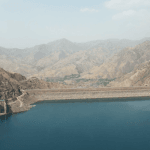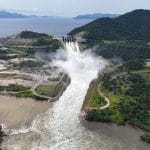Gazprom’s TurkStream natural gas pipeline to Turkey and Southeast Europe has drawn less opposition, certainly compared with the controversial Nord Stream 2 from Russia to Germany, although its goal has been the same – to allow Russian gas to reach European markets without transiting Ukraine.
According to data from S&P Global Platts Analytics, in 2019, Bulgaria received 2.4 billion cubic meters of Russian gas via the Ukraine-Moldova-Romania Trans-Balkan route and transited 4 billion cubic meters more onto Turkey. A year later the volume received via that route fell to almost zero, with TurkStream instead supplying the Bulgarian market.
Greece’s take of TurkStream gas in 2020 was up 18% on the 2.41 billion cubic meters of Russian gas it bought the year before delivered by the Trans-Balkan line, while North Macedonia’s imports were also up from the 0.3 billion cubic meters purchased in 2019, S&P Global Platts said on February 8.
TurkStream could undermine Greek and European energy interests while also pulling Turkey closer into Russia’s orbit, Justin Urquhart Stewart, co-founder of Regionally, a UK Regional Investment Platform, told New Europe by phone, adding that the second leg of TurkStream to Southern Europe would cause more issues than the first link to the Turkish market. He noted that Moscow would side with Ankara if a dispute between Turkey and Greece escalated further. “There are some interesting juxtapositions there, obviously Greece with Turkey but also Russia and Turkey themselves given recent issues they had with Azerbaijan and Nagorno-Karabakh. So, their relationship is not good but, on the other hand, they have been almost pushed together by the previous American regime. So, I think the Biden Administration would be looking to try a rather better way to manage Russia by pulling Turkey towards them and pushing Russia away. But the other side of that is it would cause significant issue with the Greek relationships,” Urquhart Stewart said.
Meanwhile, Chris Weafer, co-founder of Macro-Advisory in Moscow, noted that TurkStream 2 has been planned ever since construction of the first phase of the TurkStream pipeline started in 2017. “The extension of that first phase started in several Balkan countries more than 18 months ago. When Presidents (Vladimir) Putin and (Recep Tayyip) Erdogan formally commissioned TurkStream 1 in January 2020, it was made clear that the construction of the extension pipeline through the Balkans would pick up pace, as it has done. Yet, the project has attracted hardly any attention from US Congress or those within the EU that have been trying to stop Nord Stream 2,” Weafer told New Europe.
There are a couple of explanations for this. The argument over Nord Stream 2 is as much an argument between the US and Germany as it is about Russian gas coming to Europe, Weafer argued. “If it was the latter, then efforts to stop TurkStream 2 would have been a lot more vigorous. During President (Donald) Trump’s term in office, relations between Washington and Berlin deteriorated over several issues, including NATO funding. One way the US has been able to attack Germany is by blocking its efforts to import more energy from Russia. Washington would much prefer that Germany imported from the US, even at a higher price, as A) that would make Berlin more beholding to the US and B) it would secure American jobs and exports,” Weafer said.
The Macro-Advisory expert argued that the reality that Europe needs to import a lot more gas if it is to finally get rid of coal powered and nuclear plants. The EU has several new sources for gas, such as liquified natural gas (LNG) and the Southern Gas Corridor pipeline but they, in aggregate, will not supply enough gas, he said. “In the next two decades, Russia’s market share in Europe will go down, as competing import volumes grow, but Russia volumes will rise with Nord Stream 2 and TurkStream 2 because EU gas consumption will rise. In that sense, the EU knows it will need to import more Russian gas, so it chooses to ignore the pipeline winding its way up through the Balkans,” he said.
Weafer reminded that much has been made about the Southern Gas Corridor, bringing Azeri gas to southern Europe. “In reality, this is tinkering around the edges. The pipeline has an annual capacity of 18 bcm with half that taken by Turkey and less than 10 bcm available for Europe. In January alone, Gazprom exported 19.4 bcm to Europe, an increase of 45% over the same month last year,” Weafer said, adding that the extra gas exported in January is almost equal to the annual capacity of the Southern Gas Corridor pipeline.
“That is another reason why Germany wants Nord Stream 2 and the EU chooses to ignore TurkStream 2: Russia has the world’s biggest gas resources and is next door. It is able, and always willing, to supply as much gas as Europe needs on an on-demand basis. LNG tankers cannot sail that quickly,” Weafer said.
Asked if TurkStream 2 undermine Greek energy interests and pull Turkey closer to Moscow’s orbit, Weafer noted that energy contracts are a two-way deal: the supplier needs the revenue, and the customer needs the gas. “Despite the dispute over non-payment with Ukraine, Russia, or the Soviet-Union before it, never tried to use gas as a political weapon or as a threat – even at the height of the Cold war. It is well understood in Moscow that this would destroy the energy relationship and cost Russia dearly,” Weafer said.
“Moscow’s mantra since early 2014 is diversification: in political relations, trade, and investment. It means that Russia would never prefer one customer to the exclusion of another,” Weafer said, adding, “Yes, it sells a significant volume of gas to Turkey each year but that would never mean it would exclude another customer. For Russia, selling gas to as many customers as possible is both good politics and good economics”.
follow on twitter @energyinsider







